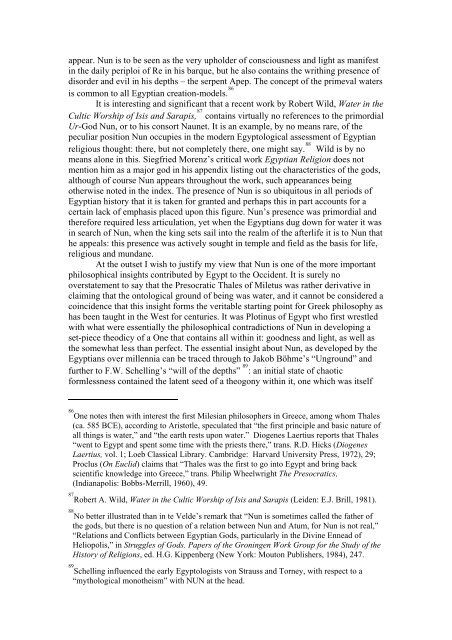THE EGYPTIAN FOUNDATIONS OF GNOSTIC THOUGHT
THE EGYPTIAN FOUNDATIONS OF GNOSTIC THOUGHT
THE EGYPTIAN FOUNDATIONS OF GNOSTIC THOUGHT
Create successful ePaper yourself
Turn your PDF publications into a flip-book with our unique Google optimized e-Paper software.
appear. Nun is to be seen as the very upholder of consciousness and light as manifest<br />
in the daily periploi of Re in his barque, but he also contains the writhing presence of<br />
disorder and evil in his depths – the serpent Apep. The concept of the primeval waters<br />
is common to all Egyptian creation-models. 86<br />
It is interesting and significant that a recent work by Robert Wild, Water in the<br />
Cultic Worship of Isis and Sarapis, 87<br />
contains virtually no references to the primordial<br />
Ur-God Nun, or to his consort Naunet. It is an example, by no means rare, of the<br />
peculiar position Nun occupies in the modern Egyptological assessment of Egyptian<br />
religious thought: there, but not completely there, one might say. 88<br />
Wild is by no<br />
means alone in this. Siegfried Morenz’s critical work Egyptian Religion does not<br />
mention him as a major god in his appendix listing out the characteristics of the gods,<br />
although of course Nun appears throughout the work, such appearances being<br />
otherwise noted in the index. The presence of Nun is so ubiquitous in all periods of<br />
Egyptian history that it is taken for granted and perhaps this in part accounts for a<br />
certain lack of emphasis placed upon this figure. Nun’s presence was primordial and<br />
therefore required less articulation, yet when the Egyptians dug down for water it was<br />
in search of Nun, when the king sets sail into the realm of the afterlife it is to Nun that<br />
he appeals: this presence was actively sought in temple and field as the basis for life,<br />
religious and mundane.<br />
At the outset I wish to justify my view that Nun is one of the more important<br />
philosophical insights contributed by Egypt to the Occident. It is surely no<br />
overstatement to say that the Presocratic Thales of Miletus was rather derivative in<br />
claiming that the ontological ground of being was water, and it cannot be considered a<br />
coincidence that this insight forms the veritable starting point for Greek philosophy as<br />
has been taught in the West for centuries. It was Plotinus of Egypt who first wrestled<br />
with what were essentially the philosophical contradictions of Nun in developing a<br />
set-piece theodicy of a One that contains all within it: goodness and light, as well as<br />
the somewhat less than perfect. The essential insight about Nun, as developed by the<br />
Egyptians over millennia can be traced through to Jakob Böhme’s “Unground” and<br />
further to F.W. Schelling’s “will of the depths” 89<br />
: an initial state of chaotic<br />
formlessness contained the latent seed of a theogony within it, one which was itself<br />
86<br />
One notes then with interest the first Milesian philosophers in Greece, among whom Thales<br />
(ca. 585 BCE), according to Aristotle, speculated that “the first principle and basic nature of<br />
all things is water,” and “the earth rests upon water.” Diogenes Laertius reports that Thales<br />
“went to Egypt and spent some time with the priests there,” trans. R.D. Hicks (Diogenes<br />
Laertius, vol. 1; Loeb Classical Library. Cambridge: Harvard University Press, 1972), 29;<br />
Proclus (On Euclid) claims that “Thales was the first to go into Egypt and bring back<br />
scientific knowledge into Greece,” trans. Philip Wheelwright The Presocratics,<br />
(Indianapolis: Bobbs-Merrill, 1960), 49.<br />
87<br />
Robert A. Wild, Water in the Cultic Worship of Isis and Sarapis (Leiden: E.J. Brill, 1981).<br />
88<br />
No better illustrated than in te Velde’s remark that “Nun is sometimes called the father of<br />
the gods, but there is no question of a relation between Nun and Atum, for Nun is not real,”<br />
“Relations and Conflicts between Egyptian Gods, particularly in the Divine Ennead of<br />
Heliopolis,” in Struggles of Gods. Papers of the Groningen Work Group for the Study of the<br />
History of Religions, ed. H.G. Kippenberg (New York: Mouton Publishers, 1984), 247.<br />
89<br />
Schelling influenced the early Egyptologists von Strauss and Torney, with respect to a<br />
“mythological monotheism” with NUN at the head.










